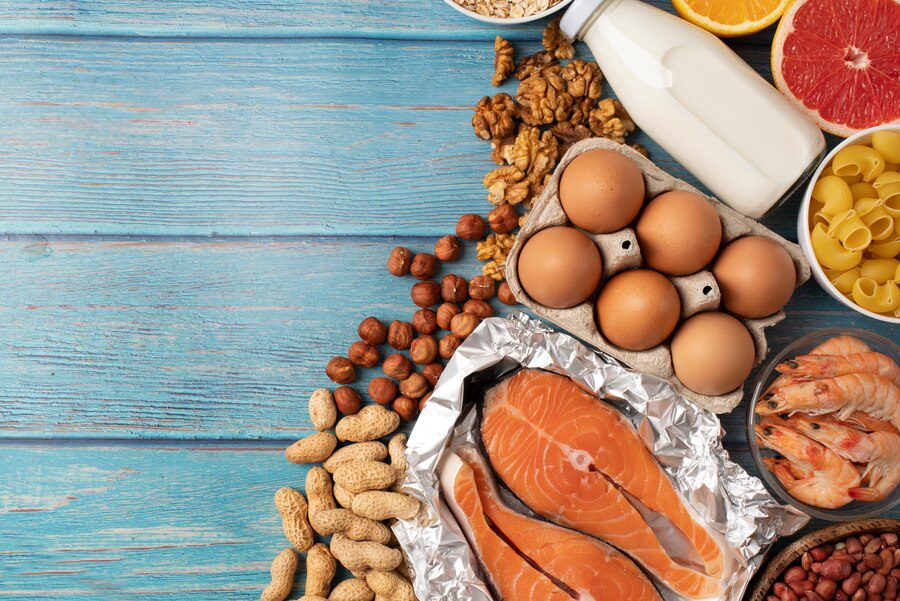This content is for informational and educational purposes only. Always consult a qualified healthcare provider.
Last Updated on April 22, 2024 by Grace Oluchi
📋 Table of Contents
Key takeaway
- Does a high-protein diet equate to higher testosterone levels?
- What happens if a man eats a high-protein diet?
- What are the potential consequences of eating a high-protein diet on testosterone?
High-protein diets have gained popularity for their potential benefits in weight loss, muscle gain, and improved athletic performance. Like, you see fitness influencers, trainers, fitness lovers, and gym bros, take their “protein shake” before a workout session, you know, for the GAINS, and superb performance.
However, there is growing concern about the potential negative effects of high-protein diets on testosterone levels, a hormone crucial for various physiological functions in both men and women. Testosterone plays a vital role in regulating libido, bone density, muscle mass, fat distribution, and red blood cell production. Fluctuations in testosterone levels can have significant implications for overall health and well-being.
Does a high-protein diet increase testosterone?


Has anybody ever told you:
“Hey, you wanna look more manly?” Or Hey bro, is your sex drive low!? start eating a high-protein diet” Yup, you’ve probably heard that somewhere or had someone tell you it’s the end of all your problems.
Now, let’s get things straight. Protein intake doesn’t directly increase testosterone levels, but it plays a crucial role in testosterone production. Testosterone is a hormone that is produced mainly in the testicles of men and smaller amounts in the ovaries of women. Protein is essential for the body to create many hormones, including testosterone.
When you consume protein, your body breaks it down into amino acids (mind you they are the building blocks of proteins). Some of these amino acids are used to produce hormones like testosterone. Additionally, protein-rich foods contain nutrients like zinc and vitamin D which are also important for testosterone production.
With all that’s been said, does it mean that eating high-protein foods directly increases testosterone levels? nope. As it was mentioned earlier, it doesn’t work that way. Excessive protein intake doesn’t equal higher testosterone levels. Too much protein can have negative effects on your overall health. Therefore, it’s all about maintaining a balanced diet that includes an adequate amount of protein along with other essential nutrients.
While a high-protein diet itself doesn’t directly increase testosterone, it is still a vital component in the process of hormone production, including testosterone. So obviously if you’re trying to improve your health and aid testosterone production, eat your proteins.
What happens if a man eats a high-protein diet?
Eating a high-protein diet regularly can have various negative and positive effects, depending on your overall health, physical activity level, and the sources and amount of protein consumed.
When a guy goes all-in on a high-protein diet, it can have some effects on his body. One big thing to watch out for is that excessive protein intake can put a strain on the kidneys. As they would have to work extra hard to process all that protein, which can potentially lead to kidney issues in the long run. So, it’s crucial to strike a balance and not go overboard with protein consumption to keep everything running smoothly.
A high-protein diet can also cause digestive issues like constipation or diarrhea. Plus, too much protein might make him feel sluggish because the body has to work harder to break it down. Finding the right amount of protein that works for his body is key to reaping the benefits without experiencing these downsides. It’s all about that balance.
What are the potential consequences of eating a high-protein diet on testosterone?
Kidney damage
Protein is super important for our bodies, but too much of a good thing can sometimes cause issues, especially for guys. When you overload on protein, it can put some strain on your kidneys. See, your kidneys have to work extra hard to get rid of the waste products that come from breaking down all that protein. Over time, this extra work can actually damage your kidneys or make existing kidney problems worse, which is not cool.
Dehydration
Another thing to watch out for is dehydration. High-protein diets can make you thirsty because your body needs more water to get rid of the byproducts of protein breakdown. This can lead to more trips to the bathroom, and potentially dehydration if you’re not drinking enough water to keep up. You don’t have to stress that much you know.
Digestive issues
Eating too much protein, especially from animal sources, can also mess with your digestion. It might cause issues like constipation, bloating, or even diarrhea. This can happen because some high-protein foods lack fiber, which is important for keeping things moving smoothly in your digestive system.
Nutrient deficiencies
Balancing your diet is key. If you’re loading up on protein but skimping on other essential nutrients, you could end up with deficiencies in stuff like vitamins, minerals, and antioxidants. It’s like trying to build a house with only half the tools you need – things just won’t work as well.
Bone health
Bone health is another concern. A 2013 review showed the link between a high-protein diet and poor bone health. Another study in pubmed suggests that too much protein can make you lose more calcium in your pee. However, the research concluded that it has no adverse effects on calcium balance. That might not sound like a big deal, but over time, it could affect your bone health, especially if you’re not getting enough calcium from other sources. Which is why you might want to consider toning it down a bit.
Increased risk of chronic diseases
Going overboard on protein, especially in diets that are low in carbs and high in animal fats, might up your risk for chronic diseases like heart issues, certain cancers, and even osteoporosis down the road. It’s all about finding that balance to keep your body healthy in the long run.
Increased weight
Weight gain is a possibility too. While protein is great for building muscles, eating too many high-protein foods can pack on the pounds if you’re not burning off those extra calories. It’s all about moderation and making sure you’re not overdoing it on the protein front.
Potential for allergies
Some folks might also have allergies or sensitivities to certain protein sources, like dairy or eggs. If you’re feeling off after eating certain foods, it might be worth checking in with a doctor to see if you have any food sensitivities
Let’s talk about the mechanism behind calcium loss due to a high-protein diet (simplified)
When you consume protein, the body breaks it down into its building blocks, called amino acids. During this process, sulfuric acid is produced, which can make the urine more acidic. To counteract this acidity, your body may release calcium from your bones. This excess calcium can then be excreted in the urine, leading to potential calcium loss.
What are some ways to prevent calcium loss from protein intake?
To prevent calcium loss from protein intake, you can consider balancing your diet with foods rich in calcium, such as dairy products, leafy greens, and fortified foods. Additionally, staying hydrated can help reduce the concentration of calcium in your urine. It’s also important to ensure you’re getting enough vitamin D, as it plays a crucial role in calcium absorption. Lastly, try to maintain a healthy level of physical activity, so you can support your bone health and calcium retention in your body.
Can certain types of protein be more beneficial for testosterone production?
Yup, certain types of protein can be more beneficial for testosterone production. You see, foods rich in high-quality proteins like lean meats, poultry, fish, eggs, dairy products, and plant-based sources like legumes and nuts can provide the necessary amino acids and nutrients for hormone production, including testosterone. Additionally, if you add sources of healthy fats like avocados, olive oil, and nuts to your diet, it can also support hormone production. It’s all about having a well-rounded diet that includes a variety of protein sources to promote overall health and hormone balance. That’s what makes a difference.

